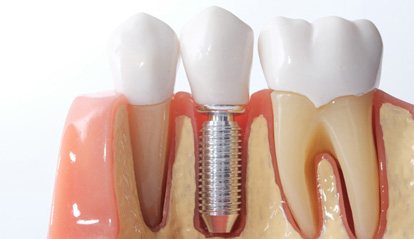
Dental Implants – St. Albans, VT
The Tooth Replacement You Deserve
Whether you are just missing one tooth or are tired of dealing with a denture that is constantly moving out of place, dental implants can provide the solution you’ve been looking for. With them, Dr. Aten and Dr. Cone can bring back an entire tooth from root to crown, fully restoring a patient’s oral health and confidence at the same time. Here at St. Albans Dental, implants are the ultimate answer to tooth loss, and they could be just what you need to enjoy a full and healthy smile again. To learn more and schedule a consultation to discuss dental implants in St. Albans, contact us today .
Why Choose St. Albans Dental for Dental Implants?
- In-House Dental Implant Placement & Restoration
- Custom-Crafted, Lifelike Porcelain Replacement Teeth
- We Accept & Maximize PPO Dental Insurance Plans
What are Dental Implants?

Dental implants are small titanium posts that are specially designed to replace the root structure of missing teeth. Once surgically placed below the gumline and into the jawbone, they’re able to fuse with the bone through a natural process called osseointegration. This creates a strong and stable foundation for any type of restoration, like a bridge, free-standing crown, or denture, to be attached to.
The 4-Step Dental Implant Process

- The first step of every dental implant treatment is a consultation with Dr. Aten or Dr. Cone —our two highly skilled and knowledgeable dental implant dentists. Our team will capture any necessary X-rays of your mouth and help determine whether you’re a good candidate for dental implants. If so, we’ll also develop a customized treatment plan that we’ll walk you through.
- Dr. Aten has completed advanced dental implant training from Engel Institute in Charlotte, North Carolina, as well as training from the renowned SPEAR Institute. As a result, our team is able to complete the surgical placement of your dental implants from the comfort of our very own office.
- For three to six months following your surgery, your implants will be fusing with the jawbone (osseointegration), and your gums will be healing.
- Final Restoration. Once osseointegration is successful, Dr. Aten can attach your permanent, custom-crafted dental restorations to them to complete your smile.
Benefits of Dental Implants

Dental implants are a permanent solution to missing teeth that offer greater benefits than dentures and dental bridges. Because they are attached to your jaw, they provide greater biteforce than other prosthetics, and they’re easier to care for and maintain, too. To learn more about how dental implants can improve your oral health, contact the team at St. Albans Dental for more information.
Day-to-Day Benefits

While your dental implants have many overarching, long-term benefits, they also have plenty of features that you will appreciate on a daily basis!
- Natural Looking: Your dental implants look just like “real” teeth and blend seamlessly in with any remaining natural teeth. You can customize their shape, size, and even their color so nobody can tell they are prosthetics!
- Increased Self-Confidence: There’s nothing more attractive than a healthy smile, and you can once again exude confidence with the help of dental implants.
- Improved Diet: If you’ve had to stop eating the foods you love because you simply cannot chew them properly, dental implants can help. Because they are secured to your jaw, they can increase your biteforce much better than removable prosthetics can, making it easy to enjoy a wider range of menu options.
- Easier Care: Unlike dentures that need to be soaked and removed to deep clean, your dental implants are permanently attached, so caring for them is much easier. Just brush them twice a day and floss them once a day just like you would your natural teeth.
Health Benefits

Dental implants aren’t just great looking, they also have many important health benefits, including:
- Jaw Strength: Missing teeth can cause your jawbone to deteriorate with time. While dentures and dental bridges can slow this deterioration, dental implants can prevent it.
- Tooth Protection: If you have remaining natural teeth, they can shift or fall out if there are gaps in your smile. Dental implants can fill in those gaps, protecting your healthy teeth and completing your beautiful smile.
- Better Nutrition: Being able to eat a wider variety of healthy foods like fresh fruits and vegetables can once again be possible with the help of dental implants.
- Better Hygiene: Gaps in your smile can create entry points for dangerous bacteria that could lead to periodontal disease and tooth decay. Dental implants can eliminate these spaces, keeping bacteria at bay and protecting your oral health.
Long-Term Benefits

In addition to the superb benefits that your dental implants will provide each day, they also have many longer-term benefits, too!
- High Success Rates: Today’s dental implants have a higher success rate than ever before. In fact, up to 95 percent of implants are successful with proper care!
- Cost Effective: While your initial investment for dental implants may be higher than other restorations, they will pay for themselves in the long term. Dental implants are easier to care for, and they require less repairs and replacements than bridges or dentures.
- Longer Life: Your dental implants are permanent, so once they are successfully placed you should not need to replace them. The crown and abutment pieces may require replacement, but unless they suffer accidental damage, they can last up to 20 years with proper maintenance.
Who Can Dental Implants Help?

Patients with any degree of tooth loss can potentially be good candidates for dental implants—all that’s needed is a mouth and jawbone healthy enough to support the new roots. Once in place, implants can be paired with a number of restorations to close the gap in a patient’s smile, no matter how large.

Missing One Tooth
For patients with just one missing tooth, an implant root can be positioned between two healthy teeth without them being altered at all. This can then be attached to a porcelain crown using a small connector called an abutment.

Missing Multiple Teeth
Bridges and partial dentures can also be attached to dental implants to restore multiple teeth while using a minimal number of posts. Implant prosthetics tend to be more stable than traditional removable ones, plus they can be trusted to last longer as well.

Missing All Teeth
Instead of just sitting on the gums, a full denture can be firmly attached to the jawbone using only four to six implants. This will make the new teeth extremely secure, plus a patient will recover much more of their bite strength compared to a regular denture, allowing them to enjoy more foods with ease.
Understanding the Cost of Dental Implants

No two dental implant procedures are the same, and because of this, the price is always different as well. The number of teeth missing, the health of the jawbone, and the type of restoration needed can all affect the overall cost. At a one-on-one consultation, we can give you an accurate estimate of what you’ll be expected to pay for implants. While they tend to be more expensive than other treatments upfront, they are an investment that is intended to last for decades, and they often help patients save money in the long run because they don’t have to be replaced every few years (like with traditional bridges and dentures).
Factors That Can Influence the Cost of Treatment

How many implants do you need to get, and what sort of prosthetic teeth will they support? If you’ve only lost one tooth to decay or an accident, a single implant and a crown is all you’ll need. On the other hand, if a few teeth in a row are missing, you might have a couple of different options; two teeth can sometimes be replaced by two crowns that share a single implant, but you’ll need at least two implants and a dental bridge if you want to restore three or more teeth. For patients with extensive tooth loss, at least four implant posts are needed to support a full set of dentures. All these restorations will come with a different cost.
Stages of Dental Implant Treatment

It takes several visits to receive a dental implant. After the consultation, the implants will be placed in your mouth via surgery. Once your mouth has healed, an abutment can be installed, and finally your prosthetic teeth will be designed and placed in your mouth. Every stage of the process comes with its own cost, and that’s not even accounting for bone grafts, periodontal therapy, and other treatments that may or may not be necessary before receiving implants. Dr. Aten and Dr. Cone will create a timeline for you so that you can plan ahead for these treatments.
Are Implants Worth the Investment?

It’s important to make sure that your dental implants are affordable, of course, but don’t forget why you’re having the procedure done in the first place. Implants provide a stronger, more stable base for your replacement teeth, giving them better chewing power and keeping them anchored in place. Also, since they last for decades (and possibly a lifetime, depending on the care they receive), they could ultimately end up costing less than traditional dentures or bridges that need to be replaced every five to 10 years.
Does Dental Insurance Cover the Cost of Dental Implants?

While insurance companies might not cover the implants themselves, oftentimes, they can help pay for related procedures, such as a crown or periodontal therapy. Check your plan to see what benefits are offered; we’re proud to accept Delta Dental, United Concordia, and many other dental insurance plans. We can also offer our in-house savings plan or financing through CareCredit if you don’t have any kind of insurance coverage.
Dental Implant FAQs
Can I get dental implants if I have gum disease?
Although gum disease is preventable, it’s a leading cause of tooth loss in the U.S. because it destroys the supporting structures of the teeth. If your smile is incomplete as a result of the infection, you cannot get dental implants without first having periodontal therapy. After treating the infection, you may need additional procedures to repair the damaged it has caused, like tooth extractions or bone grafting. While this will add more steps to your treatment plan, it is time well spent to ensure your new smile has the foundation it needs to thrive.
Am I too old for dental implants?
You’re never too old for dental implants. Your candidacy for the treatment isn’t based on your age as long as you’ve finished growing. Instead, it is determined by several other factors, like your oral and general health. Your dentist in St. Albans performs the thorough assessment you need to ensure dental implants are the right choice for you.
Does dental insurance pay for dental implants?
Unfortunately, most insurance carriers will not cover the entire cost of the treatment, but your policy may lower the amount you need to pay. Although every policy differs, you may be able to use your annual allowance after paying your yearly deductible to cover a portion of the expense for certain steps in your treatment, like the anesthesia or restoration.
A member of our office will work on your behalf with your insurance carrier to reduce the amount you need to pay out-of-pocket. We’ll find the solutions you need to replace your missing teeth without breaking the bank.
Although dental implants are more expensive than other treatments initially, they are the most cost-effective long-term because they have the potential to last for a lifetime. You’ll never need to worry about paying to replace them with the right aftercare.
Can dental implants fail?
Dental implants are the most predictable and reliable option to treat tooth loss; however, they can fail. Don’t worry, the risk of implant failure is less than 5%. Most often, it results from a preventable infection called peri-implantitis. There are several things you can do to reduce your risk of infection to ensure your new smile lasts, such as maintaining your oral hygiene and visiting your dentist at least twice a year for a cleaning and checkup.
If you’re ready to learn more about dental implants, it’s time to take the first step toward a complete smile. Contact our office today to schedule your consultation.